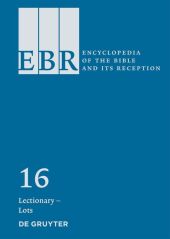 Neuerscheinungen 2018Stand: 2020-02-01 |
Schnellsuche
ISBN/Stichwort/Autor
|
Herderstraße 10
10625 Berlin
Tel.: 030 315 714 16
Fax 030 315 714 14
info@buchspektrum.de |

Volker Leppin, Choon-Leong Seow, Hermann Spieckermann
(Beteiligte)
Lectionary - Lots
2018. XLIV, 630 S. 19 b/w and 23 col. ill., 2 b/w tbl. 240 mm
Verlag/Jahr: DE GRUYTER 2018
ISBN: 3-11-031333-2 (3110313332)
Neue ISBN: 978-3-11-031333-8 (9783110313338)
Preis und Lieferzeit: Bitte klicken
The Encyclopedia of the Bible and Its Reception (EBR) is a thirty-volume series that renders the current state of knowledge on the origins and development of the Bible in its different canonic forms in Judaism and Christianity. Furthermore, it documents the history of the Bible´s reception, not only in the Christian churches and the Jewish Diaspora, but also in literature, art, music, and film, as well as in Islam and other religious traditions and current religious movements.
EBR moves into new terrain - the realm of reception history. The encyclopedia acknowledges that biblical texts not only have their own particular genetic background and setting, but also have been received, interpreted, and exerted their influence on countless and diverse religious, theological, and cultural settings. EBR has shaped scholarship on the Bible and its reception.
EBR is a resource tool not only for scholars in biblical and religious studies, but in cultural science, the arts, or literary history as well. It is also accessible to general readers interested in the Bible.
Edited by an international team of more than thirty-five scholars, all experts in their fields, two volumes are published per year.
EBR is also available in an online version. A comprehensive search engine makes EBR Online a very useful tool.
Further information on " "
The print edition was launched in Rome on July 1, 2009, with the publication of the first two volumes. Here are a few reactions from experts:
"This is surely a creative and original project that will fill a need in today´s biblical studies, [...] a monumental work which is indeed a treasure trove of information on the Bible and on how it has influenced people over the centuries."
(Stephen Pisano, S.J., Pontifical Biblical Institute, Rome)
"[...] the Bible is not just a 6th-5th century BCE or a 1st-2nd century CE document. It is equally an 8th century, 12th century, 16th century, and 20th century CE document. [...] With the publication of the Encyclopedia of the Bible and Its Reception, it is now possible to respond to the intellectual challenge of that insight. With its unparalleled combination of historical critical and reception historical articles, the EBR reconfigures the very conception of what it means to do biblical studies and invites a veritable paradigm shift in the discipline."
(Dr. Carol A. Newsom, Charles Howard Candler Professor of Old Testament, Candler School of Theology, Emory University)
"So what must one know nowadays in order to be a biblical scholar? That´s simple: everything - from the text itself through the Dead Sea Scrolls, Christian Scripture, Origen, Augustine, Rashi, Abarbanel, Calvin, Spinoza, Wellhausen, etc., etc., right up to the contributions of feminist and postcolonial criticism, queer studies, Bible and mass media - whatever happens to be on someone´s scholarly agenda. Of course no one can know all of that stuff. More important than knowing it all, however, is recognizing how essential it all is to what we do. I am grateful to the editors and publisher of EBR for sharing that recognition, devoting 30 volumes to this fabulous repository of knowledge, and putting it at our disposal."
(Alan Cooper, Professor of Bible at Union Theological Seminary and at Jewish Theological Seminary)
The Encyclopedia of the Bible and Its Reception (EBR) pursues a twofold task. Firstly, it comprehensively renders the current state of knowledge on the origins and development of the Bible according to its different canonic forms in Judaism and Christianity. Secondly, it documents the history of the Bible´s reception, not only in the Christian churches and the Jewish Diaspora, but also in literature, art, music, and film, as well as Islam and other religious traditions and current religious movements.


